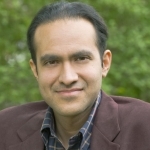 (HOST) Commentator and UVM Professor Saleem Ali has been reflecting on lessons from the Juan Williams firing episode which go beyond NPR and Fox News.
(HOST) Commentator and UVM Professor Saleem Ali has been reflecting on lessons from the Juan Williams firing episode which go beyond NPR and Fox News.
(ALI) Unlike me, Juan Williams was not a "commentator" for public radio. He was a news analyst, defined by NPR as a "…journalist with objectivity as a requirement." Yet, as an avid listener of NPR I was troubled by how their relationship ended. Still, I am not here to comment on the episode itself, but rather on the underlying assumptions about human behavior which this story revealed.
As a Muslim-American, I am often profiled at airports and usually don’t object, as long as the inquisitors are polite and I don’t miss my flight. While I rarely wear non-Western garb in public, there are many of my relatives who do. My mother always wears the Pakistani dress, which includes a long shirt and baggy trousers, and she has been a U.S. citizen for thirty years. Perhaps Mr. Williams was concerned not about such dresses but rather about the burqa – and the niqab, which covers the face. A small number of Muslim women wear this, and many Muslims, including myself, do not endorse such attire, since it can very well be a security hazard. However, there are now guidelines for airport officials, and all passengers in such garb have to reveal their face to airport personnel before being allowed through security. But often it is men who are singled out for questioning, rather than women, and they rarely cover their faces. The term "Muslim garb" in this context probably refers to someone with a beard who is wearing a cap or a turban and a robe of some sort. Often Hindu and Sikhs may be confused with Muslim men, as became tragically apparent when a few such men became victims of hate crimes after 9/11.
One can understand the fear which may come from observing such people as "the other," because often images of angry mobs in Muslim countries that blaze across our screens are dressed as such. However, from a purely rational perspective, terrorists know of such profiling, and it is no wonder that the 9/11 hijackers, in fact, were dressed in Western clothes.
So this leads us to the point of what societal purpose might be served by highlighting such fears. The point that apparently was being made by Fox News in this context was that political correctness prevents us from "speaking our mind." Yet there is a reason why it might not be socially useful to always "speak our mind." Candor is no inherent virtue and should be used where it clearly serves societal good. Fox News is right to be concerned about muzzling news analysis if it is solely for the sake of some preordained code. However, if that code is serving a societal purpose to prevent irrational fears and anxieties from taking over the public, then it should be considered as such. Strategic restraint and composure are time-tested virtues, which must always be considered before "speaking what’s on our mind."